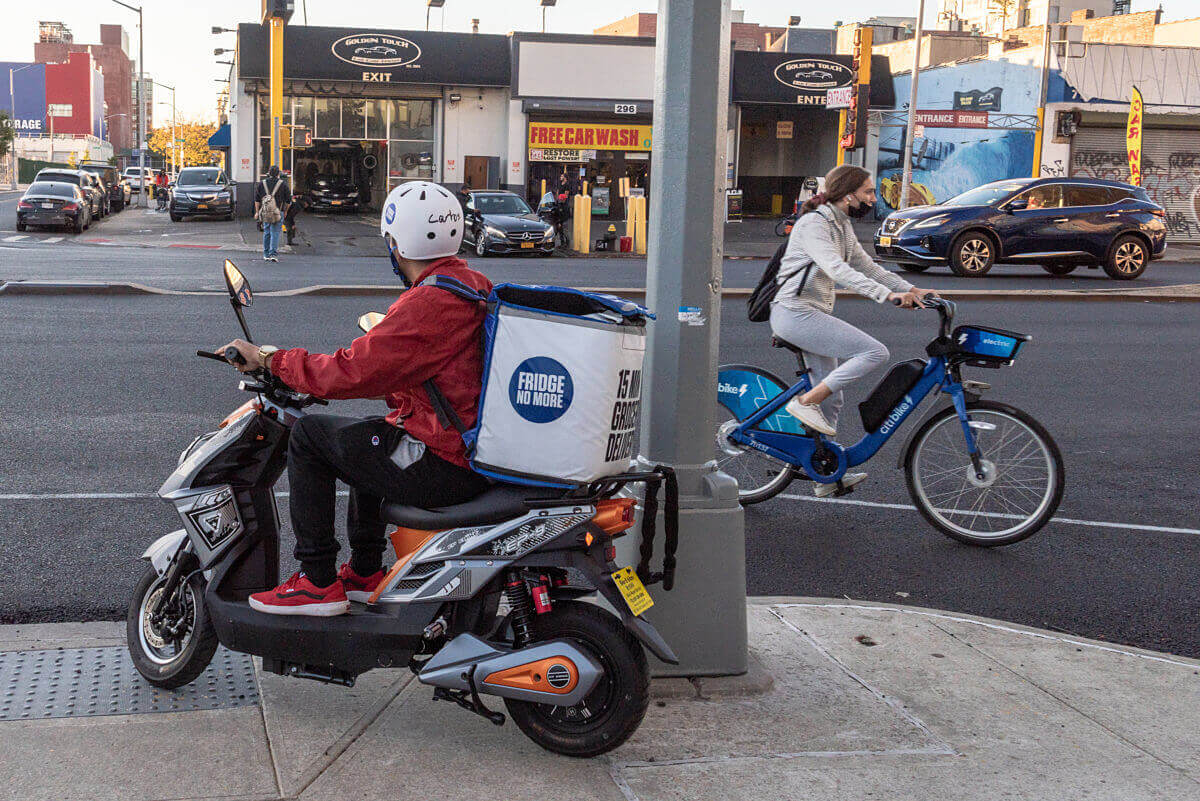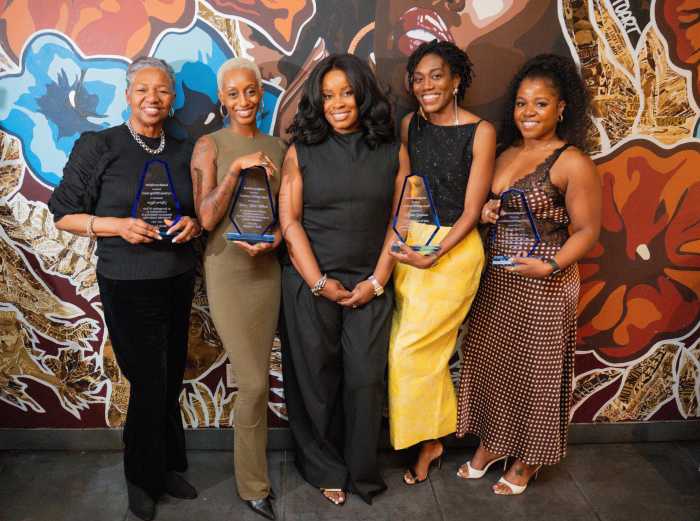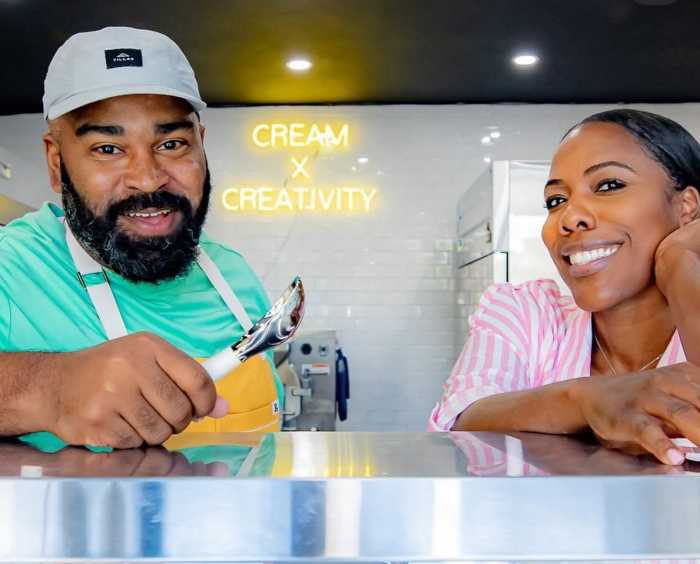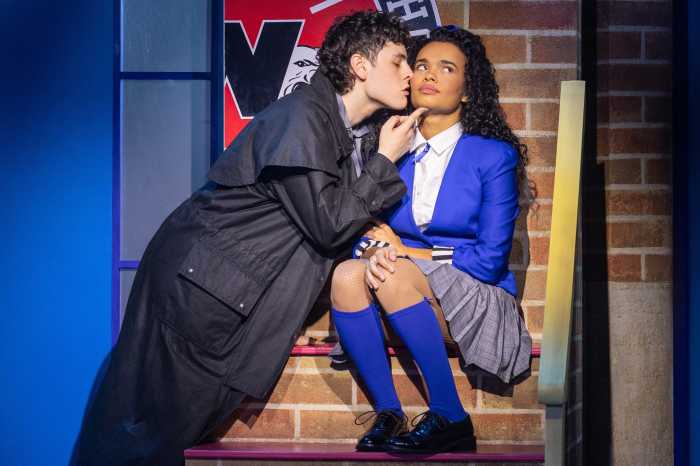This is the first story in amNewYork Metro’s five-part series examining the proliferation of grocery delivery services across the city — and the impact they’re having on residents and brick-and-mortar business owners alike.
In a city where the sight of delivery workers whizzing by on an electric bicycle with an insulated bag strapped to their back has become ubiquitous, a handful of new grocery delivery apps have emerged — all marketing the speed at which they can have a forgotten dinner ingredient, pint of ice cream, or roll of toilet paper at your door.
Startups including JOKR, Gorillas, and Fridge No More are slowly marking their territory in New York City, setting up shop in a select handful of neighborhoods and luring in customers with the promise of getting their order within ten or fifteen minutes, whether it’s two items or 20.
They join a legion of other delivery apps that have changed the dining game in New York City, like Uber Eats and DoorDash, who deliver hot meals from restaurants right to your door, and InstaCart which outsources your grocery list to a contracted worker who will do the shopping for you and deliver it to your home. Fresh Direct, the city’s oldest online delivery service, delivers all their food from their mega-warehouse in the south Bronx.
Apps like JOKR and Gorillas mirror Fresh Direct’s approach. Their orders are filled in their own warehouses, not at independent grocery stores or restaurants — but that’s where the similarities end. Rather than concentrating their stock in one huge warehouse, they make use of “dark stores,” micro-warehouses scattered across the city. Each micro-warehouse delivers to the neighborhood it’s in, not citywide.
Each of JOKR’s dark stores serves about one square mile, said Tyler Trerotola, a US co-founder of the app. The company uses a software that calculates how far an eight-minute ride on an electric bicycle is, then draws a “polygon” around the warehouse to show the coverage area.
“We try to place those a mile apart from each other,” Trerotola said. “Once in a while, we will overlap them. We try not to, but say there’s an area with really high demand, and we want to make sure we’re meeting that demand, there’s potential to have somewhat of an overlap on these polygons.”
JOKR launched in New York City in June with four hubs, and have since expanded to ten, delivering to Williamsburg, Long Island City, all of Manhattan below 35th Street, Midtown East, the Upper East Side and the Upper West Side. The company expects to open an additional ten hubs before the end of the year.
Started last spring by German entrepreneur Ralf Wenzel, the founder and CEO of FoodPanda and former partner of SoftBank, JOKR had raised more than $170 million by July from financiers including Tiger Global and GGV Capital.
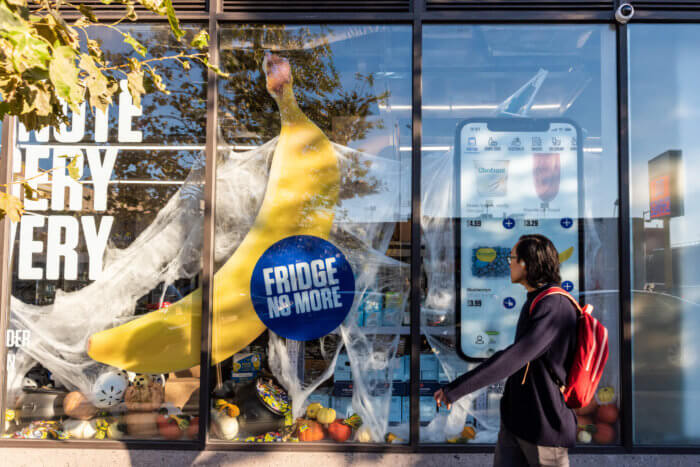
Gorillas in the midst
Gorillas, a Berlin-based app launched in June 2020 by Kağan Sümer, quickly became the first European startup to achieve “unicorn status,” raising more than $1 billion in less than a year with the help of investors including Coatue Management, DST Global and Atlantic Food Labs.
With warehouses dotted across Europe, New York City has always been “the biggest prize,” said a Gorillas spokesperson via email.
“The grocery shopping culture here is uniquely suited for our business model, especially when you consider how frequently you see lines down the street to get into the grocery store,” the spokesperson said. “NYC is a fast-paced city that needed an on-demand delivery service that could deliver what New Yorkers need exactly when they need them.”
The company made its first foray in the city in May, making deliveries in Bushwick and Downtown Brooklyn. It has expanded rapidly in the following five months, operating more than 11 warehouses citywide and delivering to wide swaths of Manhattan, Long Island City, and Williamsburg, with plans to open more in the coming weeks — including one in Prospect Lefferts Gardens on Oct. 30.
“Each Gorillas warehouse is strategically located to target a specific neighborhood, reaching a dense population,” said the representative. “We only place a warehouse if we feel fully confident that we can deliver to the specified radius on time. That said, larger neighborhoods have two warehouses if necessary, and customers must physically be within range of one at the time of ordering.”
When setting out for expansion, JOKR used a tool that broke down “the whole world” by population density and food and drink consumption, Trerotola said, then picked out the most attractive markets. High population density is critical for their business model since each hub delivers to such a small area.
“We largely are targeting young adults to young families, I would say ages 23-40,” Trerotola said. “People who, at some point, need convenience and speed in their life. Anything from families who are busy and don’t have the time to cook for their children to the young professional who is trying to put together a recipe and doesn’t have the time to go grocery shopping for that last minute ingredient.”
Gorillas endeavors to tap into local knowledge to familiarize themselves with a city and begin community engagement, their spokesperson said.
“This process entails thorough research into each neighborhood we enter, from as broad as the customer demographic to as specific as the busiest intersection in the neighborhood, all for the purpose of offering an assortment of groceries that reflect the specific needs of a community.”
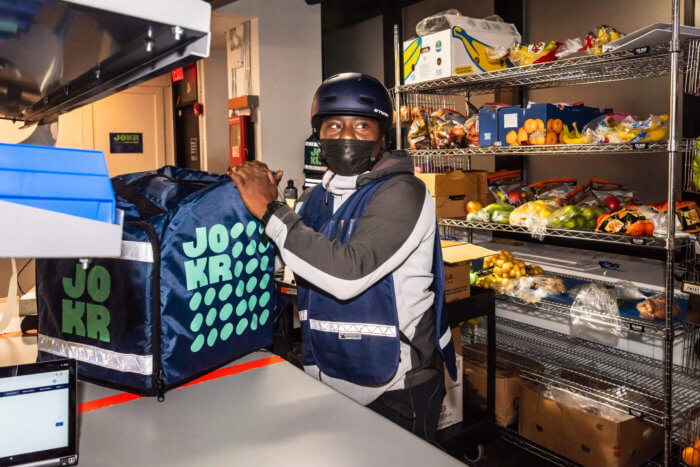
Business models
If the expansion of Fridge No More, which started operations in Brooklyn just a year ago, is any indication, shoppers won’t have to wait long before they have their pick of delivery apps.
The app, which raised more than $15 million in funding last April, now delivers to nearly all of Manhattan, from 143rd Street to Thames Street, as well as Long Island City, Astoria, and Brooklyn neighborhoods from Greenpoint to Prospect Lefferts Gardens.
Both apps also carry products from much-loved local businesses. Customers buying groceries from JOKR can add Flatbush-based Justin’s Nut Butter to their cart, and Gorillas offers meat and charcuterie from Brooklyn Cured.
Neither app has a minimum purchase threshold and JOKR doesn’t charge a delivery fee. Gorillas’ is nominal, at just $1.80 per order.
Trerotola said JOKR’s prices are comparable to a traditional grocery store, if not a little bit lower.
JOKR buys directly from the source, Trerotola said, often in bulk and at a discount. With fewer overhead costs because of the smaller footprint of the micro-warehouses versus a large grocery store and more control over their stock and food waste, he said, they can pass on the money they save to their customers.
“I think we set out, as any startup does, with a fairly aggressive roadmap on expansion,” he said. “It was yet to be seen whether this was something that took off in a city like New York where you already have so many convenience items.”
“To my shock, I think we’ve grown faster than we ever expected. The demand has outpaced what we expected, and I think it has really shown there is a product market fit here, and that people do demand more convenience in this world, especially when it comes to grocery shopping.”
Our next story in The Race to Deliver series will include comparison shopping between these grocery store apps and items sold at traditional grocery stores and supermarkets.


